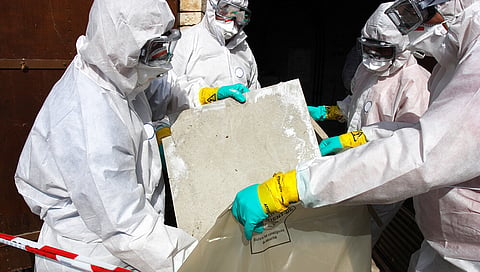Remembering Nirmala Gurung, The School Teacher Who Led The Fight Against Asbestos Poisoning
Nirmala Gurung, 68, passed away on September 9. The retired schoolteacher spent her lifetime teaching schoolchildren in Kymore town of Katni district, Madhya Pradesh. Her students were mainly children of workers at the nearby asbestos cement sheet manufacturing unit, which was initially owned by Belgian firm Eternit.
Gurung’s living quarters too were made entirely with asbestos. She had no clue that the material could cause health problems, and was diagnosed with parenchymal asbestosis, a lung disease that affects people exposed to asbestos fibre, in 2016.
The diagnosis happened only after Delhi-based Environics Trust began working in the area and conducting health camps to monitor the health effects of the asbestos unit. It is likely that Gurung had been affected much earlier.
Although India banned asbestos mining in 1993, substantial quantities of it continue to be imported.
Gurung accepted the diagnosis with equanimity, admitting that for several years she had no clue at all that asbestos could harm human lungs. Once she realized the life-shortening effects of asbestos, she championed the complete ban of asbestos. In 2017, she addressed a 2,000-strong audience at the UN Forum on Business and Human Rights in Geneva, explaining why it was so necessary to treat all asbestos waste scientifically to reduce harm to the environment and to human health.
“I have seen many victims dying slowly and painfully. It’s really horrible to watch a healthy person turn into a skeleton. I wish the coming generation must be saved from this and that the first and foremost there is a need for proper treatment of the asbestos waste which the factory dumped in the surrounding populated area. Asbestos must be banned and those suffering from asbestos diseases must be compensated,” she said.
She spoke extempore to an international audience, needing no notes. Her voice rang with the pain and conviction of one who was suffering herself.
Although India banned asbestos mining in 1993, substantial quantities of it continue to be imported. Laurie Kazan-Allen, of the International Ban Asbestos Secretariat, writes, “In developed countries, you can’t even give asbestos away nowadays; there are laws which prevent society’s use of this poisonous substance.
To absorb the fall in global demand for chrysotile (white asbestos, its most common variety), asbestos pushers have aggressively targeted consumers in countries with booming economies and lax health and safety regulations. They found a ready market in India as well as ruthless entrepreneurs willing to exploit a substance regardless of the potential harm it poses.”
Asbestos sheets remain common roofing material for houses built under schemes meant for the poor in India. Once these sheets are damaged even slightly, fragments can fly loose and be inhaled, causing damage to lungs.
Sreedhar Ramamurthi, managing trustee of NGO Environics Trust that has been campaigning for compensation to asbestosis patients, said, “We have diagnosed 1,700 people with the condition.”
Nirmala Gurung’s campaign will not be forgotten. “Through her suffering, she became more alive to the plight of others and campaigned till the end for the ban on asbestos,” says Pooja Gupta of the International Ban Asbestos Secretariat.
-- Rosamma Thomas/Pune
(The author is a freelance journalist based in Pune)

